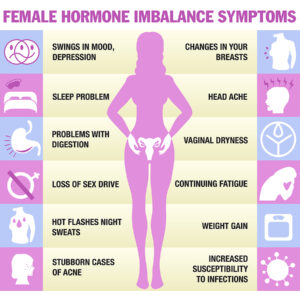Dr. Erika Schwartz spoke at the 30th Anti-Aging Conference in Las Vegas about “hormone imbalance can impact health”. The talk was scheduled early in the morning on Dec. 10, 2022. She pointed out that when hormones are in balance people have energy, they sleep well, they have normal sexual functioning and they are fertile. But in contrast, when hormones are not in balance, their weight goes up, they suffer from fatigue, depression, and anxiety. In addition, they often have skin and hair changes, changes in menstrual regularity, acne, infertility and decrease in libido. Finally, they may have problems in building muscle mass, women develop vaginal dryness and men erectile dysfunction. However, people also can develop autoimmune conditions and various cancers.
Symptoms of hormone imbalance at various ages
Teens
Most importantly, acne is an embarrassing, but common symptom. Depression, PMS, mood swings and headaches are also very common. By the same token, weight gain occurs frequently from faulty diets (fast food, lack of vegetables and fruit and sugary soda drinks).
The twenties and thirties
The birth control pill interferes with the normal function of LH and FSH resulting in lack of ovulation and infertility. Other symptoms are bloating, constipation, weight changes, libido changes and postpartum depression.
The forties and fifties
Mood changes and irritability, weight problems, menstrual changes, and changes in sexual desire are typical for this age group.
The sixties and over
Hot flashes are common in this age group, but they can start in women from the age of 50 onwards. Other symptoms are night sweats, insomnia, skin and muscle changes. Many diseases of the aging occur like diabetes, arthritis, cardiovascular disease, dementia, degenerative and autoimmune diseases.
Diagnosis of hormone imbalance
The doctor takes a detailed history about exposure to environmental pollutants, the birth control pill in women and medications. In addition, the doctor wants to know whether the patient consumed meat from animals that were treated with antibiotics. Next the physician inquires about physical changes, symptoms of hirsutism, menstrual
irregularities and infertility. There are three steps to diagnosing hormone imbalances:
- Listen to the patient and inquire about the subjects just mentioned.
- Order extensive laboratory tests including hormone levels.
- Review all of the medications and supplements the patient is taking.
How do hormone imbalances affect our bodies? They affect our mental health, our sleep, brain function, libido, energy, weight, digestion (leaky gut), joints and the immune system.
Two clinical examples about hormone imbalances
Dr. Schwartz gave two clinical examples showing how correction of hormone imbalances led to normalization of the hormone imbalance.
Example 1
A 17-year-old female complained about acne in her face, had no periods, was fatigued and had migraine headaches. She was in senior high school and wanted to look and feel better before graduation. Her periods started at age 12, but were irregular. Her physician started her on the birth control pill at age 14. Within one year she stopped having any periods and also started getting hyperpigmentation in her face. Dr. Schwartz noted that she had no allergies and that she did not take any supplements. She took Estarylla (ethinyl estradiol/ norgestimate), a BCP formulation and Excedrin for migraines. Her ferritin level was 12 (11 to 307 micrograms per liter is normal for women). TSH was 5.16 (normal now 0.5-2.5). This meant she was borderline iron deficient and also mildly hypothyroid.
Diagnosis and treatment plan
Dr. Schwartz diagnosed a hormone imbalance. The treatment schedule consisted of stopping the BCP, start a low dose 30 mg NP thyroid in the morning. In addition, the doctor prescribed adrenal support pills and low-dose iron pills with vitamin C. The doctor also addressed lifestyle and self-awareness issues with the patient. 4 months later she was seen again and had regular periods, no more migraines and she felt more energy. The face pigmentation was gone and she felt great.
Example 2
A 42-year-old woman presented to Dr. Schwartz with psoriatic arthritis, weight gain, problems sleeping, brain fog and irregular periods. Her last menstrual period was 6 months ago. Her doctor had recently placed her on a statin drug and put her on the BCP Mirena. This is a progestagen releasing IUD placed in the uterine cavity, which was given to her in an attempt to regulate her periods. She was divorced and a mother of 3 children. At work she was a business partner in a high stress law firm. Personally, she was trying to date, but has been unsuccessful so far. She would like to lose weight and gain more energy. What she was hoping for was that her doctor address her overall health.
Medication and blood tests
She did not have any allergies. Her medications consisted of Rosuvastatin 10 mg daily and Mirena for the last year. As supplements she took Turmeric. Blood tests showed that her hemoglobin A1C was 5.7, the vitamin D blood level was 17 ng/mL (very low). The TSH level measured 1.29 (in the normal range). Estradiol blood level was in the lower range, progesterone level the same. Finally, her testosterone level was low as well. The other blood tests were all normal.
Diagnosis for this patient and treatment plan
Dr. Schwartz diagnosed hormone imbalance due to natural and environmental factors.
She ordered Mirena to be removed and to stop Rosuvastatin. Instead, she started the patient on vitamin ADK ( a mix of vitamin A, vitamin D and vitamin K)– 5000 IU daily. She also started her on Omega3 1000mg daily. In addition, she discussed a well-balanced diet, regular exercise and sleep issues (7-8 hours every night) with her.
Hormone replacements
As blood tests showed a low estradiol level, she started her on Estrogel, a form of estrogen. She also started her on progesterone tablets (Prometrium) 100 mg at bedtime as well. This keeps progesterone and estrogens balanced. As her testosterone was on the low side, she started her on Testosterone cypionate 100 mg/ml (0.4 cc per injection) intramuscularly once a month. Dr. Schwartz also started adrenal support, 2 capsules in the morning. Further she was told to start 3 capsules of NMN (Nicotinamide Mononucleotide Supplements) daily and 5 units of Semaglutide subcutaneously weekly. The latter medication helps the pancreas to release the right amount of insulin when blood sugar levels are high.
Follow-up at 6 months
The doctor reassessed he patient after 6 months. She had developed increased self-awareness. She lost 30 pounds and she slept for 7.5 hours most nights. Her energy level has increased and she improved her dietary choices. She had started regular work-outs. Overall she was now happier at work and at home with her children. She feels now more like an age of 25, and she has been starting to date.
General remarks about hormone imbalance
When hormones are in balance, we are healthy. Hormones can get out of balance at any age; the examples above involved 17 and 42 year old patients. Keep in mind that it is impossible to have optimal health without balanced hormones. Dr. Schwartz said that the more pieces of the puzzle you address, the more likely you are going to truly help improve quality and quantity of life. Lifestyle factors that must be addressed are:
- Diet
- Exercise
- Stress Management
- Sleep
- Breathing
- Mitochondrial and cellular integrity
Conclusion
Hormone imbalances occur frequently when our lifestyle factors are slipping. Often untoward side effects of medication are also contributing to the hormone imbalance. The holistic doctor takes a thorough history, examines and takes blood tests including key hormone tests. When imbalances of hormones are detected, this has to be addressed with supplements and hormone replacements. At the end the hormones balance each other and the patients’ abnormal symptoms disappear. It only takes a few weeks before the patient will feel normal again.







